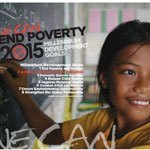
Access to energy is widely regarded as the “missing” Millennium Development Goal (MDG) and debate among development experts is that, poverty eradication and the general global socio-economic condition would improve if energy were to be identified as the ninth MDG. The global community adopted eight MDGs in 2000 to improve the general socio-economic conditions in the world, particularly in developing countries. These goals range through gender, education, health, poverty and the environment.
While remarkable progress has been recorded to implement some of the agreed goals, most countries are still not on track to meet the desired targets by 2015 due to various factors such as limited resources as well as addressing new and emerging challenges including climate change.
However, development experts argue that the oversight of energy in the original MDG list has had an impact on how the world responds to issues of sustainable development and poverty reduction.
The United Nations Development Programme (UNDP), for example, says that energy is central to sustainable development and poverty reduction efforts. Energy affects all aspects of development — social, economic, and environmental, including livelihoods, access to water, agricultural productivity, health, population levels, education, and gender-related issues.
“None of the Millennium Development Goals can be met without major improvement in the quality and quantity of energy services in developing countries,” the UNDP observes.
In this regard, there is need for the global community to intensify efforts that improve access to energy as a critical tool in the attainment of most MDGs, especially Goal 1 seeking to reduce by half the proportion of people living in poverty by 2015.
Sadc’s population totals about 270 million and, according to some estimates, just 30% have access to energy in the form of electricity, mostly in urban areas.
This figure falls to an average of 2% in rural areas, where the majority of the people live — far from the 35% consumption level that African leaders pledged to achieve at their 8th Session of the African Union Summit in 2007.
- Chamisa under fire over US$120K donation
- Mavhunga puts DeMbare into Chibuku quarterfinals
- Pension funds bet on Cabora Bassa oilfields
- Councils defy govt fire tender directive
Keep Reading
The majority of people in southern Africa still rely on traditional energy sources including wood or other biomass such as crop waste as the dominant fuel for cooking. This comes at a huge cost to the environment as families continue to cut down trees for much-needed fuel.
Therefore, attaining energy self-sufficiency would go a long way in improving Sadc’s chances of reaching the MDGs and creating opportunities for people to prosper.
Access to modern energy facilitates economic development by providing more efficient and healthier means to undertake basic household tasks and undertake productive activities more generally, often more cheaply than by using the inefficient substitutes, such as candles and batteries.
Modern energy can power water pumping, providing drinking water and increasing agricultural yields through the use of machinery and irrigation.
Improving access to clean energy fuels will also ensure that women’s burden to provide water and food for their families is reduced.
In rural communities in Sadc, as in other developing regions of the world, children commonly spend significant time gathering firewood, fetching water and cooking instead of attending school.
Access to improved cooking fuels or technologies would, therefore, facilitate school attendance. Electricity is also important for education since it improves communication, particularly through information technology and by ensuring availability of basic needs such as lighting.
Improved access to electricity and modern fuels reduces the physical burden associated with carrying wood and frees up valuable time, especially for women, widening their employment opportunities.
In addition, street-lighting improves the safety of women and girls at night, allowing them to attend night schools and participate in community activities. Data from the Southern African Regional Universities Association shows that more men than women enrol for tertiary education, despite the fact that the latter makes up more than half of the Sadc population.
Education facilitates the empowerment of women and men to participate more fully in development processes and decision-making by equipping them with these skills.











